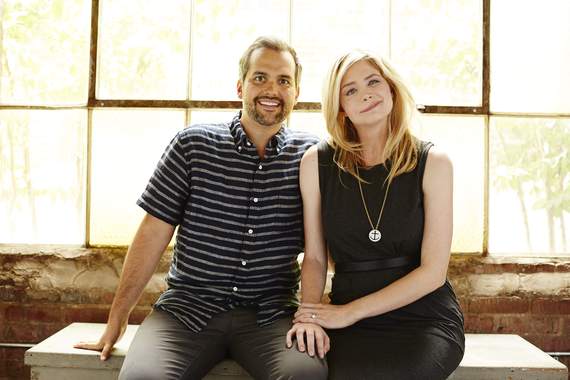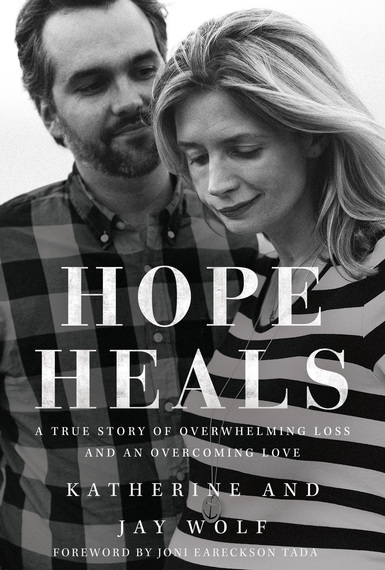In their debut book, Hope Heals: A True Story of Overwhelming Loss and Overcoming Love, Katherine and Jay Wolf share the story of their devastating pain -- and ultimate healing -- after a brain stem stroke nearly took Katherine's life eight years ago.
At the time, the couple were raising their 6-month-old son, James, while pursuing their dreams in Los Angeles -- Katherine in the modeling and entertainment industry and Jay in law school. The day of the stroke, Katherine underwent and survived a precarious 16-hour surgery, but her future recovery remained uncertain. She spent 40 days on life support in the ICU and nearly two years in full-time rehab -- re-learning how to walk, talk, and eat.
Today, Katherine continues to live with repercussions from the stroke, including facial paralysis, double vision, deafness, and a lack of fine motor coordination in her hand. Despite the obstacles, she was able to give birth to a second son, John, last summer, and both she and Jay radiate a profound depth of joy and peace. Through their struggles, the couple has learned to find celebration in each day and their book is a testament to the healing power of hope in their lives.
What sparked your desire to write this book?
We didn't initially seek to write a book, but as life played out and the tangled forest of our nightmare lightly thinned, the path was right at our feet. To be honest, during my recovery, we were so desperate to hear from others who'd had similar trauma and had found hope, yet we couldn't get our hands on any books or materials that could help.
As I got stronger and was able to leave rehab, I realized what a unique position we were in. Our marriage was still intact, my cognitive abilities were intact, and we had enough resources to take the time to write together. Let's be honest, after a debilitating stroke or brain injury, most marriages are not intact. Most people who are disabled are on welfare, and their disability checks don't stretch far enough to let them sit and reflect and write. Many don't have the same fine motor skills to let them type for long periods of time or even hold a pen. So, these unique privileges were given to us, and we wanted to give back - to produce a book that has real hope.
In what ways have you seen your story help others?
People all over the country have reached out to us from the very start. A number of them are people who say they prayed for me or followed my story online and were constant cheerleaders of ours, who turned out to later have their own nightmare occur and had to come back to our story. It's a strangely large crowd and it's fascinating.
People in the worst moments of their lives want to feel like they are not alone. The need for community is so much more exaggerated when your physical condition makes it difficult just to walk out the door. Reading our book or seeing our videos on our website has helped create community. And this book community, plus a digital community, helps reverse the effects of isolation.
Another striking thing is that the rawness of our story gives people permission to share their real stories and not present "shinier" versions of their struggles and most vulnerable selves out of fear that listeners can't handle it or won't understand.
What can people who have not suffered through something as life-altering as a stroke learn from reading about your experience?
Our story seems to give people permission to go places in their lives that we tend to avoid as a culture or we haven't been shown how to talk about - like suffering and death. When we're brought to the end of ourselves, whether we've lost limbs or brain functioning, or we can't keep a marriage together or a loved one sober, we're at the cliff's edge of our own mortality, our own power. It's natural to ask the deeper questions: Does my life have meaning? Is there a God? If so, does he care for me? Am I being punished? Will I ever laugh again? What if everyone leaves me?
In the book, you write about the strong foundation you had unknowingly created for your marriage and your faith before the stroke. What advice would you offer to someone who finds themselves in the midst of a trial unprepared?
As long as you have breath, it is never too late to seek a foundation stronger than yourself. If we're without one, we're essentially free-falling, and usually we are panicked and quick to grasp for anything or anyone. Discerning what is false and what is true and good takes wisdom, which is ancient. So seeking wisdom really means seeking out wise friends who have a lot of compassion and have sought out a wisdom greater than themselves.
What can we do to foster a spirit of hope and celebration in the midst of our daily, routine lives?
Surely the notion of "this might be your last moment" is either terrifying or exhilarating. Being mortal means we're always living into the place of near-death, so in that place recognize every moment is a gift. I have found that the best way to foster this sense of every-moment-is-a-gift is by engaging the hard stories. Maybe it takes life being undeniably terrible before we can truly recognize it's undeniable splendor.
Has your understanding of hope changed since the stroke happened? If so, how?
Hope before my stroke had much more to do with the outcomes of life and how things are supposed to be. After my stroke, the paradigm has changed. Hope is no longer hope in the situational. I have hope in the eternal good that God is providing, including a restored body one day, and the good of the moments I'm given now. In that sense I'm living more momentarily - being present and thankful - no matter what the situation is.
What message do you hope readers will take from the book?
That hope is not a sentimental accessory to life, fragile as a butterfly wing. It is real power. It is strong enough to raise the dead. But it's also tender enough to heal the most fragile places: our souls.
To learn more about Katherine and Jay, visit HopeHeals.com.


